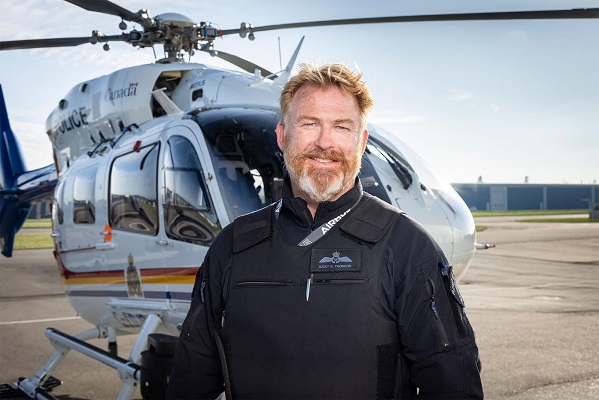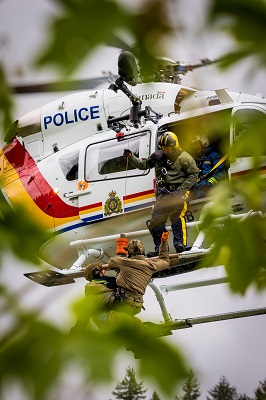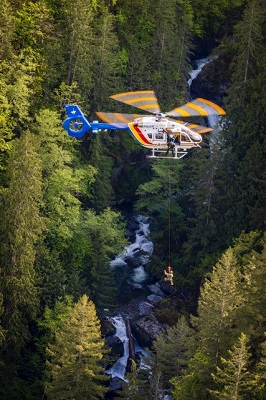Patrolling from the sky
B.C., Air Services
2023-12-15 10:09 PST
On a cold, yet beautiful November afternoon, Special Constable Roger Thomson recalls how time has literally flown by since he joined the RCMP’s Air Services program in 2006 as a helicopter pilot.

Larger image: Special Constable Roger Thomson (provided by Heath Moffatt Photography)
I’ve been a pilot for over 30 years total and this is the longest time I’ve ever worked for one company
, he said. I can tell you there’s never a boring day around here, and no two days are ever alike.
Prior to joining the RCMP, Roger worked as a commercial pilot for a company based on Vancouver Island. Living in the Lower Mainland, he would often get deployed for several weeks at a time. He was referred to apply to the RCMP job posting by a friend, a retired Mountie who had returned to the RCMP as a helicopter pilot. Roger recalls that his friend understood the toll it was taking on him to be apart from his young family.
Since joining the RCMP’s Air Services program 17 years ago, I’ve had a more regular and typical schedule. At the end of my shifts, I get to go home, watch my kids grow up, and spend time with them and my wife. That stability and work-life balance is priceless.
RCMP pilots are hired externally and given Civilian Member status (CM). Once there are enough pilots hired across the country to make a small troop (between 6 to 8), they are sent to Depot for an Air Services Special Constable conversion course where they receive instructions on basic powers of arrest, use of force and related intervention techniques, transport of prisoners, witnesses and evidence. After completion of the Special Constable course, they become Regular Members of the RCMP and are able to graduate in the iconic RCMP Red Serge.
What’s changed in the last few years is that we no longer have to wait for enough new people to form a Special Constable group at Depot before they are hired. Now, when pilots are hired and receive security clearance, we can get them going with on-field training and send them to other various training they need for the specific aircraft they’ll be flying. Then, once there are enough new people, they will be sent to Depot as a group,
Roger explained.
Roger is licensed to fly the three types of RCMP’s rotary aircrafts – the small Airbus EC20s, the Airbus EC30 A-Star, and the only RCMP twin engine helicopter in the country, the Airbus H145.
As a helicopter pilot based in Langley Air Base, Roger conducts daily proactive patrols in the Lower Mainland using one of the EC20s. We’re basically a patrol car in the sky. We run the only RCMP patrol program in the country, meaning we are the only base who conducts proactive patrols within the Lower Mainland of British Columbia, supporting all police departments, both Municipal and RCMP. We also work with and liaise with other Municipal Police Agencies across the country who similarly operate Air Patrol programs such as the Winnipeg, Edmonton and Calgary Police Services
.
We’re a team,
Roger says about their two-person crew when patrolling from the air in the Lower Mainland. The pilot, accompanied by a Tactical Flight Officer (TFO) who runs the police operational equipment, are always scanning up to 32 channels, as they patrol through all the municipalities, to determine who needs support and where they are needed to respond. It’s easier for us to deploy when we’re already up in the air conducting our proactive patrols.
Roger explains that his job as the pilot is to safely get the TFO in the best viable position to be able to perform his job in support of frontline officers. If we’re following a suspect, my job is to make sure the TFO is able to maintain the track on that person, whether in a vehicle or on foot.
The RCMP uses the larger, twin engine helicopter, the Airbus H145, to transport people like the Emergency Response Team, Explosive Disposal Unit, Police Dog Services and the Underwater Recovery Team, or during search and rescue operations, due to its hoisting capabilities and the ability to fit more people and equipment inside.


It’s an exciting job, being an RCMP pilot,
Roger said. Helicopters generally fly lower than fixed wing aircraft, so we are directly involved with the file, and we’re able to provide real-time operational support to our frontline officers on the ground. Helicopters also have the ability to fly slower than airplanes and because of that, are more manoeuvrable and agile and can land in smaller, confined spaces like parking lots, fields or mountain tops.
When asked what he enjoys most about his job, Roger said that he gets to have a unique perspective of the Lower Mainland. I get to respond to a variety of situations and I’ve seen some really crazy things when following suspects from the air. You’d be amazed at some of the things suspects would do to get away from the police, the places they would drive into or over and where they would try to hide, day or night. It’s very rewarding to be able to support the Members on the ground and knowing that the skills I have can make a difference in people’s lives.
The RCMP is currently hiring. Learn more about Air Services Pilot opportunities by visiting the links below:
- Rotary Wing Pilot (LES-PT-01) – closing date December 29, 2023
- Fixed Wing Pilot (LES-PT-01) – closing date December 29, 2023
Released by:
BC RCMP Communication Services
778-290-2929
Follow Us:
- Date modified: